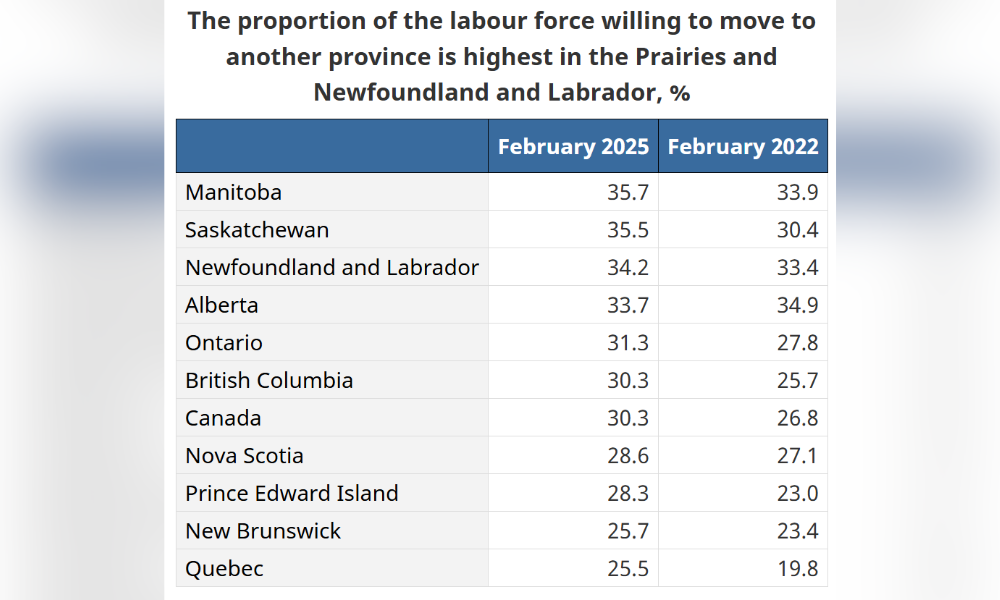
Which provinces, territories and industries are most popular for moving across the country?

The number of Canadians open to relocating within the country for employment has risen slightly over the past three years, but remains relatively low, according to a recent study by Statistics Canada (StatCan).
Overall, just 3 in 10 (30.3%) of Canadians say they would be willing to move to another province if they are offered a suitable job.
That is up 3.5 percentage points from February 2022.
The data remains low even though the unemployment rate jumped to 6.6% in February 2025 – from 5.5% in February 2022.
“As labour market conditions change, the ability or willingness of Canadians to move to a different region or province for a job can increase opportunities for employment and reduce potential mismatches between the needs of employers and the available workforce,” says StatCan.
In deciding where to go, immigrants from India appear to be preferring Canada over the United States, according to a previous report from the National Foundation for American Policy (NFAP).
Men (32.9%) are more likely than women (27.4%) to be open to relocating for work, according to the StatCan study.
Regionally, workers in Manitoba (35.7%), Saskatchewan (35.5%), and Newfoundland and Labrador (34.2%) are the ones most willing to relocate for employment.
Conversely, those in Quebec (25.5%) and New Brunswick (25.7%) report the lowest willingness to move to another province for work.

Meanwhile, across occupations, workers in natural and applied sciences and related occupations are most likely (35.6%) to report that they would be willing to move to a different province if a suitable job was offered.
In comparison, workers in management occupations (26.0%), education, law and social, community and government services (27.0%) and health occupations (27.8%) were least likely to report that they would be willing to move.
In our increasingly mobile world, employees are more frequently moving from one province to another, according to a previous report.
Personal or family considerations are by far the most common reasons for not being willing to move to another province for a job, according to StatCan.
Nearly three-quarters (73.2%) of Canadians unwilling to move cite personal or family reasons, with 60.9% prioritizing staying close to family and friends, and 9.1% indicating their immediate family would not want to move.
Financial constraints also play a role, with 5.3% citing financial concerns and 2.2% attributing their reluctance to high housing costs elsewhere.
While credential recognition challenges can pose a barrier to interprovincial mobility, they are rarely cited as a primary deterrent (0.5%), according to the report.
Previously, the federal government – as well as Alberta, British Columbia and Ontario, among other provinces – have stepped up to make credentials recognition easier for workers for workers who are relocating.
Moving across the country for work can be beneficial to workers, according to the federal government.
It says that making the move can help workers:
put their skills to work where they are needed
find more job opportunities
find higher wages in different areas of the country
Workers who are moving to a new city, province or territory to work may qualify for the moving expenses tax deduction. They can claim:
transportation and storage costs
temporary living expenses
cost of cancelling a lease
incidental costs related to your move
costs that you may have to pay to keep your old home
Workers may also apply for the “non-accountable moving allowance” if their employer is paying or paying them back for their moving costs, says Employment and Social Development Canada.